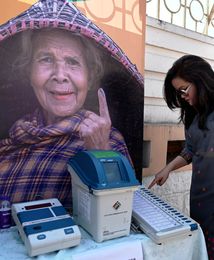The recent Lok Sabha election was the largest democratic exercise in human history. Spanning seven phases over seven weeks, more than 642 million out of 969 million registered voters cast their votes. This massive turnout underscores India’s profound commitment to democracy, a cornerstone of our civilisational ethos. It is safe to say that democracy is the national ideology of our great nation, with its vitality manifesting in each election cycle.
India, historically revered as a land of education and knowledge, has long embraced democratic principles. At a time when much of the world was governed by monarchies, India upheld a rich tradition of democracy that spanned thousands of years. This deep-rooted democratic spirit finds its origins in India’s ancient traditions of sustainable development and spiritual democracy. Democracy was innate to our civilisation and that is why our nation is known to be the mother of democracy, being one of the oldest and the largest democracies of the world.
The 2024 election marked a significant milestone in our democratic journey. Conducted by the vigilant Election Commission of India (ECI), it not only reaffirmed our status as the world’s largest democracy but also highlighted the logistical feat of organising polls for 100 crore eligible voters.
Despite initial scepticism, the EVMs have proven their reliability through rigorous testing and numerous court challenges, including Supreme Court mandates for all machines to include Voter Verifiable Paper Audit Trail (VVPAT) units. These measures have bolstered public confidence in the electoral process, despite occasional criticism from defeated parties.
Since the introduction of EVMs, instances of electoral fraud and human errors have significantly reduced, along with other malpractices like booth capturing and ballot stuffing, which were common in many parts of India. It is debatable whether a nascent party like the Trinamool Congress, led by Mamata Banerjee, would have won the historic West Bengal elections in 2011 against the CPI(M), which had ruled the state for decades and was known for electoral misdemeanours, without the fairness and security brought to the polling process by the EVMs.
For many years now the Congress has been blaming the EVMs when it lost any election, but laughingly the EVMs were given credibility when the party won an election. Such behaviour shows that winning is everything for some people and national interest is secondary.
Elon Musk’s comment on the possibility of EVMs being hacked by humans or AI, in response to a report on alleged voting irregularities in Puerto Rico, has once again caused a stir among certain groups in India. The time is right for India to highlight one of its most underrated and successful indigenous innovations. At present, Namibia, Nepal, Armenia, Bangladesh, Bhutan, Australia, Belgium, Bulgaria, Italy, Switzerland, Canada, Mexico, Argentina, Brazil, Chile, Peru and Venezuela, besides the US, use some form of electronic voting.
India’s EVMs are a testament to indigenous innovation. They boast over 275 safety protocols, including a single-use, encrypted chip and stringent transportation and storage SOPs. Designed without any capability to connect to networks, such as Wi-Fi or bluetooth, Indian EVMs are impervious to remote hacking or external interference, ensuring unparalleled security and reliability.
As Prime Minister Narendra Modi rightly said, the poll result is a victory for the democratic world showcasing resilience, peaceful conduct of elections and smooth transfer of power. The election has raised the credibility of the EVMs as the result symbolises impartiality and transparency.
Lekhi is former Union minister.


